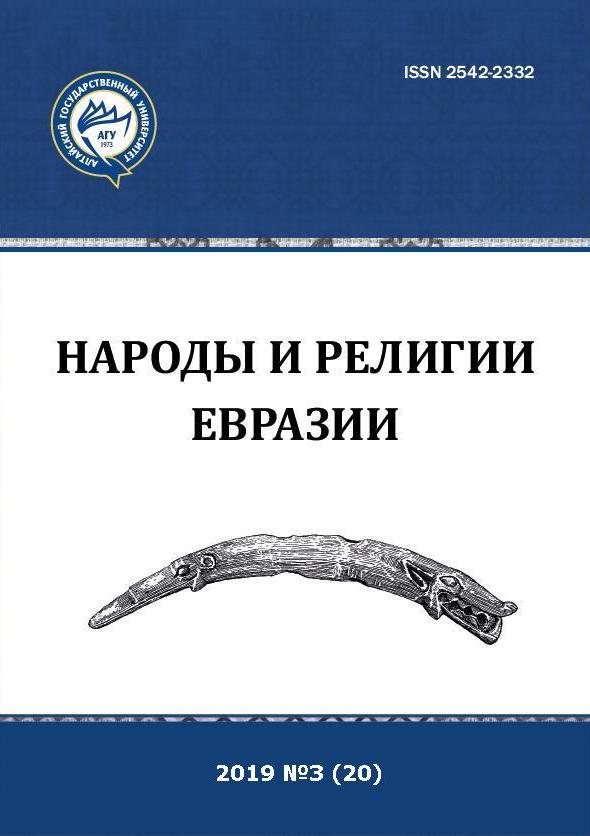The position of officials of the Orenburg Department on the legal regulation of the spiritual life of the Kazakhs of the Ural and Turgay regions (40–80-ies of XIX century)
Main Article Content
Abstract
The purpose of the article is to identify the positions of governors-General and officials of the Orenburg Department on the regulation and legal regulation of the life of Muslim communities of Kazakhs of the Ural and Turgay regions. The chronological framework of the work covers 40-80 years of the 19th Century. During this period, the implementation of the policy of integration of traditional Kazakh society in the socio-cultural and religious space of the Russian Empire, which was accompanied by the search and development of its optimal strategies and practices. The main sources of the article were the records of the Central and regional authorities of the Russian Empire — the Ministry of internal Affairs and its Department of spiritual Affairs of foreign confessions, the Office of Orenburg Governor-General, deposited in the RGIA. The work is based on the civilizational method using historical-genetic and historical-system methods.
The position of officials of the Orenburg Department on the legal regulation of the spiritual life of the Kazakhs was determined by a number of external and internal factors: progressive advance of the Russian Empire deep into Central Asia, contradictions and unresolved problems of Russian-Khiva and Russian-Bukhara relations, activation of religious activity in the steppes of the Tatar and Bashkir mullahs. In this regard, in the 40-s of the XIX century there was a course to limit the spread of Islam in the Kazakh steppe and the isolation of the Kazakhs of their sphere of influence of the Orenburg Muslim spiritual Assembly. Orenburg Governor-General and officials of the border administration consistently followed this course. Its logical conclusion was the legal consolidation of all the above trends in the Temporary regulation on the management of the region, adopted in 1867.
Downloads
Metrics
Article Details

This work is licensed under a Creative Commons Attribution 4.0 International License.
References
Батунский М. А. Россия и ислам. М., 2003. Ч. II. 377 с.
Загидуллин И. К. О проектах оренбургского генерал-губернатора Н. А. Крыжанов-ского по реформирование ОДМС в 1867-1877 гг. // Девятые Большаковские чтения. Оренбургский край как историко-культурный феномен. Оренбург, 2018. С. 219-229.
Моисеев В. А. Россия и Китай в Центральной Азии. Барнаул, 2003. 187 с.
Почекаев Р. Ю. Религиозная политика Российской имперской администрации как фактор фронтирной модернизации: от О. А. Игельстрома до К. П. фон Кауфмана // Религия в истории народов России и Центральной Азии: материалы II Международной научной конференции. Барнаул, 30-31 октября 2014 г. Барнаул, 2014. С. 247-252.
Рыбаков С. Г. Устройство и нужды управления духовными делами мусульман России // Ислам в Российской империи (законодательные акты, описания, статистика) / под ред. Д. Ю. Арапова. М., 2001. С. 246-271.
Султангалиева Г. «Татарская» диаспора в конфессиональных связях казахской степи (XVIII-XIX вв.) // Вестник Евразии. 2000. № 4. С. 20-36.
Тихонов А. К. Католики, мусульмане и иудеи Российской империи в последней четверти XVIII — начале ХХ вв. СПб., 2008. 365 с.
Халфин Н. А. Присоединение Средней Азии к России. М., 1965.
Lysenko Y. A. Slave trade and slavery in the central Asian outskirts of the Russian empire (XVIII-XIX centuries // Bylye Gody. 2018. Vol. 47 (1). Pp. 172-182.
Lysenko Y. A. The problem of security of trade caravans in Russian-kazakh relations in the first half of the XIX century // Bylye Gody. 2019. Vol. 50 (1). Pp. 138-148.

